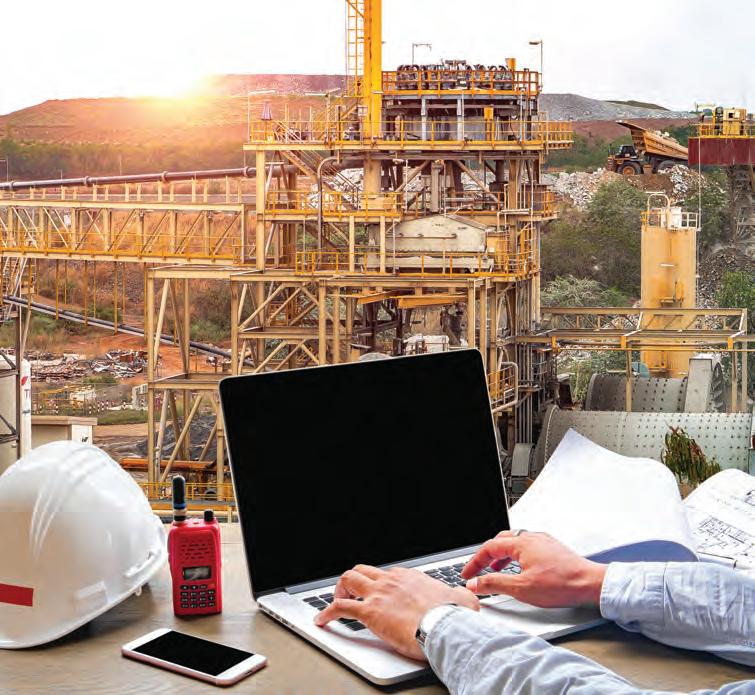
4 minute read
Socially conscious profits
Mining squares up to the social investor
Sustainable mines are more likely to attract investment in a changing world.
Increasing pressure from stakeholders for mining companies to be transparent in their social, economic and environmental impact has ignited an industry trend of seeking socially conscious profits. As mining companies enter a new decade, stakeholders are increasingly directing their investments towards companies committed to environmental, social and governance (ESG) principles.
The benefit of keeping investors satisfied while also strengthening a business’ financial position is why Deloitte Australia’s mining & metals leader Ian Sanders believes mining companies should go green.
“Decarbonisation makes sense operationally. Electrified mines are easier to automate,” Sanders says
“The cost benefits of decarbonisation also can’t be ignored. Although there are capital costs to setting up the infrastructure to support the generation of renewable power, the consumption costs associated with renewable energy are negligible.”
Sanders suggests electric mining will eradicate the operational expenses of traditional mining equipment.
“This price dynamic has the potential to radically alter the cost basis of mining. In traditional mining operations, energy is generally the first or second most significant spend, accounting for 15 to 40 per cent of operating expenses,” he says.
The decision to undertake a sustainable approach can also boost business for mining companies through the efficiency of electric mines.
“With ore grades declining and mineral deposits being as challenging as they are to extract,” Sanders says.
Sanders stresses that the devotion towards decarbonisation must extend down the supply chain.
“Sustainability teams within our mining organisations do not have the bandwidth or depth to be able to achieve their stated objectives,” he says.
“That’s not because they don’t want to, but those objectives are so significant and vast, i.e. the different FACED WITH GROWING INVESTOR DEMAND, DELOITTE HAS ITS SIGHTS SET ON GUIDING THE MINING INDUSTRY INTO AN AGE OF ENVIRONMENTAL REMEDIATION AND DECARBONISATION. NICK ZAKHARIA WRITES. “Electrification, digitisation, automation are all going to be techniques that we need in mines to move us through into a new era.”
examples of mining companies talking about decarbonisation footprint to 2050.
“To be able to get there they are going to need to be talking right through the supply chain.”
With an emphasis on an ethical supply chain, Sanders believes these objectives can be attained.
“Mining clients are very proactive for going back into their supply chain, saying we want to make sure that we have an ethical supply chain,” he says.
“Leadership is paramount, not just from the top because the tone of the organisation is set at the top.
“It has to come from within each and every person within the organisation. The only way you can do that effectively is to ensure every leader is adopting those principles.”
Mining companies are aiming to attract and maintain investors by reducing emissions following significant pressure from stakeholders.
The environmental, social and economic impact needs to have value beyond compliance for this to be successful, according to a report by Deloitte.
“I think some are finding value and some aren’t,” Sanders says. “It may have been a bit hit and miss. There’s one thing beyond doubt, the sector is changing and changing fast.”
Yet the most significant challenge that mining faces, according to Sanders, is the industry’s public reputation.
“In many jurisdictions around the world the level of trust in mining is low, even though the industry is critical in supplying raw materials and driving the economic development of regions around the world,” he says.
With companies such as Deloitte pushing the envelope for a greener future, there is a chance for the mining industry to restore their reputation.
And Sanders hopes that an increase of trust in the mining industry will attract new investors, who are vital to the future of the mining industry.
“You need to find new investments,” he says. “New investments can come in the form of expansion activity, but people are also looking at the next generation of mines.”
And it’s not just the mining industry being pressured into more sustainable business practices.
Approximately 800 financial organisations with $US118 trillion of assets are applying climate risk disclosures to their folio investments in 2019, according to the Deloitte report.
The report also found 26 global banks have halted direct financing for new coal plant projects.
Sanders hopes that joint ventures will be able to reduce the environmental impact of mining. “It is not only the majors…you take the likes of Ken McKenzie for example, saying that climate change is a complex problem, we can’t do it alone,” he says.
“That is code for we need joint ventures, partnerships, alliances, ecosystems to work our way through some of the big issues facing us or the planet.
“This type of shared value collaboration allows companies, governments, communities and other key stakeholders to work together to strengthen local economic clusters, achieve greater social impact, and increase the return on social investment.
“However, reaching this end goal is clearly a journey, which is why mining companies should start small before adopting a model that pools all funds and integrates governance structures.”

Technology is guiding companies towards achieving better ESG outcomes.










